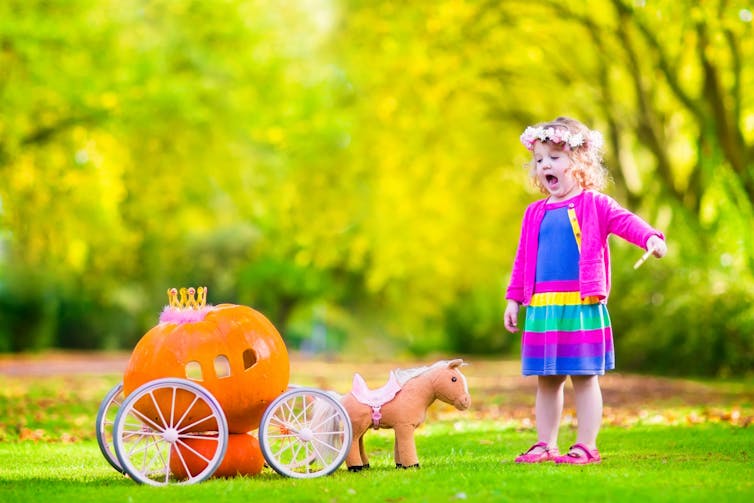You know how to find happiness: Just meet Prince Charming (or Cinderella), overcome all obstacles, get married. The end.
Sure, we kind of know real life doesn’t work like that. And yet this “romantic” story remains right up there on its cultural pedestal. We measure ourselves against it when we “fail.”
I know how that feels. I’m polyamorous — in two simultaneous loving relationships — which is a “failure” condition because if you really love someone, you aren’t supposed to want anybody else.
But I’m also a philosophy professor, and I say this blinkered focus on a single story arc is making us miserable.
Can’t we dethrone the fairy tale, and celebrate a range of stories with real people in them? Wouldn’t it be more creative — not to mention more honest — to craft the role of love in our lives to fit who we truly are?
I’m not saying we’d all go around singing Happy Days Are Here Again if that happened, but I am saying love-crafting is conducive to living a meaningful life, which might just be the key to a deep kind of happiness.
The freedom to choose
As philosophers are wont to do, let’s start by distinguishing two concepts of “happiness.” One is about nice feelings: Hedonic happiness. The other is about broader well-being or flourishing — what Aristotle called eudaimonia. If you are eudaimonic, you might be deeply satisfied with your life, but that doesn’t necessarily mean you feel good all the time.
Philosophers love to pull apart concepts like this, but we also like to mash disparate concepts together and see what happens. My conceptual recipe for love-crafting has three main ingredients drawn from happiness research, the world of business and management and the philosophy of love. A strange brew, sure, but hear me out.

Let’s start with happiness. It is quite well known that happiness is tied to agency — that is, making one’s own decisions. The link can be understood partly in biological terms. As neuroscientist Alex Korb explains, one study using functional magnetic resonance imaging (fMRI) to measure brain activity shows that:
“(a)ctively choosing caused changes in attention circuits and in how the participants felt about the action, and it increased rewarding dopamine activity.”
Dopamine feels good, but there’s more to it than just that. Psychiatrist and Holocaust survivor Viktor Frankl’s work with suicidal prisoners in Nazi death camps led him to conclude that having a sense of meaning or purpose in life is ultimately what makes it worth living. He stresses agency in this connection, noting that:
“Everything can be taken from a man but one thing: the last of the human freedoms —to choose one’s attitude in any given set of circumstances, to choose one’s own way.”
Reshape the raw materials
OK, but what does this have to do with business and management? Here we toss job-crafting into the mix. This concept was introduced by researchers Amy Wrzesniewski and Jane Dutton in 2001 to “capture the actions employees take to shape, mold, and re-define their jobs.”
Although a job description determines the “raw materials” you have to work with, job-crafters creatively reshape their work for better alignment with their strengths and values.
Wrzesniewski describes one of the original inspirations for their theory: A hospital cleaner who switched around the pictures in the rooms of coma patients, in case something about the changing environment might encourage their healing. This wasn’t in her job description — she chose to make it part of her role.
This is huge, because the connection with agency brings eudaimonia into view. As Annie Dillard powerfully reminds us in The Writing Life, “(h)ow we spend our days is, of course, how we spend our lives.”

Now for the third ingredient: Intentional love. This has roots in the thought of social psychologist Eric Fromm, psychiatrist M. Scott Peck and feminist cultural critic bell hooks. In All About Love, hooks, for instance, says that: “(l)ove is an act of will, both an intention and an action,” and that “will also implies choice. We do not have to love. We choose to love.”
Although we are taught to think of love as out of control, something we “fall” into, an “addiction,” and even a form of “madness,” that is not intentional love.
Break the rules
Now to combine the ingredients together:
1) Exercising agency is tied to happiness — not just good feelings, but a deeper sense that one’s life has meaning.
2) Job-crafting is a powerful way to exercise agency, even when your role has been externally prescribed.
3) Love, like work, can be practised intentionally and thoughtfully.
Conclusion? Love-crafting has got to be worth a try.

So what would it look like? Better to ask what it does look like. Many love-crafters “break the rules” (as do some of their job-crafting counterparts).
Some forge a network of loving friendships that (gasp!) doesn’t include a focal romantic relationship. Some craft non-monogamous marriages, non-sexual romances, queer loves and all kinds of things we don’t have labels for yet.
Others craft “normal” relationships. The difference between a monogamous, hetero (etc.) relationship that’s “fallen” into and one that’s chosen is all the difference in the world.
As Frankl says in Man’s Search for Meaning, “happiness cannot be pursued; it must ensue.” Philosophers have tried to tell us this for centuries, and now they have empirical evidence to back them up. Once the point sinks in, it’s obvious: Chasing a “happily-ever-after” that’s externally prescribed by a one-size romantic ideal is a great way to ruin our chances of being happy-ever-at-all.
Intentionally crafting love to make it meaningful to you? Now that might have a shot. This does not mean a life of wall-to-wall The Hills Are Alive happiness — hedonic feelings tend to come and go.
Rather, my money is on this hypothesis: like job-crafting, love-crafting tends towards eudaimonia — the deep happiness that makes everything else possible.

